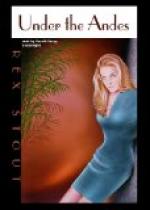I was interested in the question as one is always interested in a riddle; but I tossed it from my mind, promising myself a solution on the morrow, and gave my attention to the vagaries of nature about me.
We were passing through a cleft between two massive rocks, some three or four hundred yards in length. Ahead of us, at the end of the passage, a like boulder fronted us.
Our footfalls echoed and reechoed from wall to wall; the only other sound was the eery moaning of the wind that reached our ears with a faintness which only served to increase its effect. Here and there were apertures large enough to admit the entrance of a horse and rider, and in many places the sides were crumbling.
I was reflecting, I remember, that the formation was undoubtedly one of limestone, with here and there a layer of quartzite, when I was aroused by a shout from Harry.
I approached. Harry and Desiree, with Felipe, the arriero, had halted and were gazing upward at the wall of rock which barred the exit from the passage. Following their eyes, I saw lines carved on the rock, evidently a rude and clumsy attempt to reproduce the form of some animal.
The thing was some forty feet or so above us and difficult to see clearly.
“I say it’s a llama,” Harry was saying as I stopped at his side.
“My dear boy,” returned Desiree, “don’t you think I know a horse when I see one?”
“When you see one, of course,” said Harry sarcastically. “But who ever saw a horse with a neck like that?”
As for me, I was really interested, and I turned to the arriero for information.
“Si, senor,” said Felipe, “Un caballo.”
“But who carved it?”
Felipe shrugged his shoulders.
“Is it new—Spanish?”
Another shrug. I became impatient.
“Have you no tongue?” I demanded. “Speak! If you don’t know the author of that piece of equine art say so.”
“I know, senor.”
“You know?”
“Si, senor.”
“Then, for Heaven’s sake, tell us.”
“His story?” pointing to the figure on the rock.
“Yes, idiot!”
Without a sign of interest, Felipe turned twice around, found a comfortable rock, sat down, rolled a cigarette, lighted it, and began. He spoke in Spanish dialect; I shall preserve the style as far as translation will permit.
“Many, many years ago, senor, Atahualpa, the Inca, son of Huayna-Capac, was imprisoned at Cajamarco. Four, five hundred years ago, it was. By the great Pizarro. And there was gold at Cuzco, to the south, and Atahualpa, for his ransom, ordered that this gold be brought to Pizarro.
“Messengers carried the order like the wind, so swift that in five days the priests of the sun carried their gold from the temples to save the life of Atahualpa.”
Felipe paused, puffing at his cigarette, glanced at his audience, and continued:




